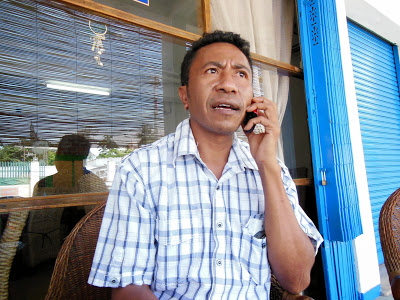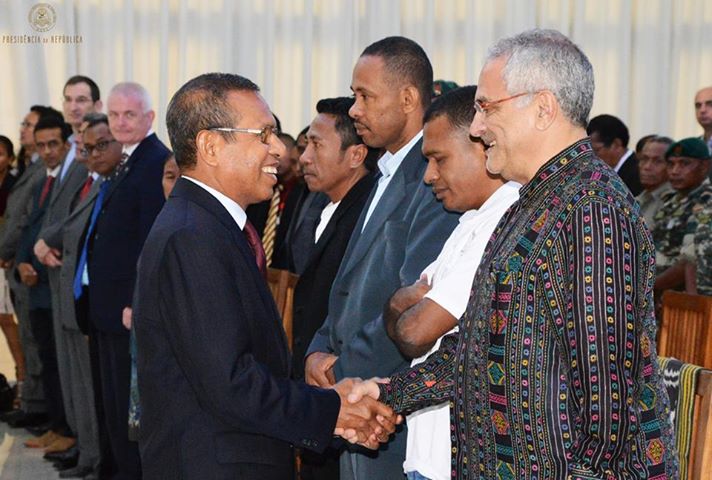
Timor-Leste investigative journalist José Belo has been presented with one of the 2013 Sérgio Vieira de Mello human rights awards by the President, Taur Matan Ruak. David Robie profiles the Tempo Semanal publisher in an interview in Dili a few days before the award.
PROFILE: Timor-Leste newspaper editor and investigative journalist José Belo is no stranger to controversy, legal threats or the inside of a prison cell.
He was imprisoned and tortured by the Indonesian occupation forces for a period during the 24 years of illegal occupation of Timor-Leste while smuggling out reports to the world from the beleagured resistance movement.
Five years ago he was threatened with a seven-year prison sentence for criminal defamation over allegations of corruption against the then justice minister.
This prompted a high-profile international appeal by journalists, academics and media freedom campaigners to then President Jose Ramos-Horta to have the case dropped.
Threats are common over Belo's campaigns to root out corruption and nepotism in his fledgling Asia-Pacific state - the world's newest nation barely a decade old.
Corruption, nepotism
"Corruption, collusion, nepotism are when people take the state money and make people suffer," he once said in a radio interview.
But Belo is a tenacious survivor and investigator.
When I met up with him, he was holding court on a Dili café terrace contemplating how best to use another bunch of leaked government documents that had fallen into his lap for his Tempo Semanal ("Weekly Times") newspaper and website.
He now also faces a broader new challenge. As president of the Timor-Leste Press Club (TLPC), one of several media groups representing journalists in his country - but reputedly the strongest with 120 members, he is trying to put the national media house in order.
The government is keen to impose a media law that some say is draconian in controls on journalists but is not subject to serious scrutiny because few have actually seen the latest draft (originally drawn up in Portuguese rather than the national language Tetum).
Unifying the industry
Belo sees his mission as to defend the "self-regulatory" status of the media and to unify the media industry.
A national media conference last October - only the second since independence - made some encouraging headway on both counts, with a national code of ethics being adopted by the entire industry for the first time.
"Journalism is in transition in Timor-Leste," says Belo. "The conference was in response to the so-called international aid, particularly from the United States and Australia, which has been misused in the name of journalism in this country."
It is understood more than US$5 million has been spent on various media aid programmes in Timor-Leste, but - according to Belo - this has "mostly been wasted".
He singled out the US International Centre for Independent Journalism (ICIJ) programme for his criticism.
Government-recruited
While the programme was supposed to produce independent and investigative journalism, "most of the so-called independent journalists ended up working for the government".
According to Belo, leading NGOs responsible for media training "don't know what they're doing" and the local journalism fraternity need to take back responsibility for the future of the country.
But there are serious questions about the government's intentions over the controversial draft media law, says Belo.
"We have asked for a copy, we have even written requesting a copy but to no avail," he says.
"It is being orchestrated. Their [government's] attitude is that you can't criticise it. It's not a Bible. Why have they made it so secret?
"I can't see what they have in mind to control the media. It's very suspicious that they are hiding the draft law from the journalists."
Belo says they are in the process of lobbying parliamentarians to try to persuade them to easy off on the haste to consider this bill, and about the importance of freedom of the press in Timor-Leste.

Journalists 'sacrificed'
"We are worried that the owners of the press are happy to protect their interests while sacrificing the journalists."
Belo recognises the paradox of arguing for the interests of journalists when he himself is a newspaper owner, albeit the owner of a tiny but feisty publication.
"Capacity-building for trainee journalists is our number one priority. Journalism and media skills training are critical, we need scholarships and we need media industry support for investigative journalism.
"But we don't want the government's agenda imposed on us, and we don't want the donors' agenda.
"We want our own agenda for the good of journalism in this new democracy."
Foreign aid
"And my lesson has been that we need to be very careful about foreign aid."
In the meantime, Belo and his rival editors have a novel approach to collaboration and consultation.
They get together for an early morning brainstorming session over coffee in the Acait restaurant near Parliament - the "little people's café" - to touch base on the day's stories and how they have been handled editorially.
"We talk about headlines and the stories that have been given the big treatment. And we ask our fellow editors about where they think they went wrong. Our criticism is robust."
It is a tonic that symbolises the growing "new professional" mood about journalism in Timor-Leste.
Footnote: The 2013 Sérgio Vieira de Mello human rights awards were presented to José Belo, the director of Tempo Semanal newspaper for his advocacy of human rights in the Civil and Political Rights category; Rosito da Silva Belo was recognised for his project called Promove Diálogu Komunitária kona-ba Rai (Promoting Community Dialogue on Land) in the same category; and Gaspar Afonso was the winner in the Social, Economic and Cultural Rights category with his project Promove Labarik no Feto Defisiénsia Matan Sira-nia Direitu (Promoting the Rights of Blind Children and Women).
Pacific Media Centre director Dr David Robie is on a sabbatical visit to Timor-Leste and is a volunteer attached to La'o Hamutuk (Timor-Leste Institute for Development Monitoring and Analysis). David was member of a NZ Electoral Commission media monitoring team to Timor-Leste in 2007. This article was originally published on his blog Cafe Pacific.



